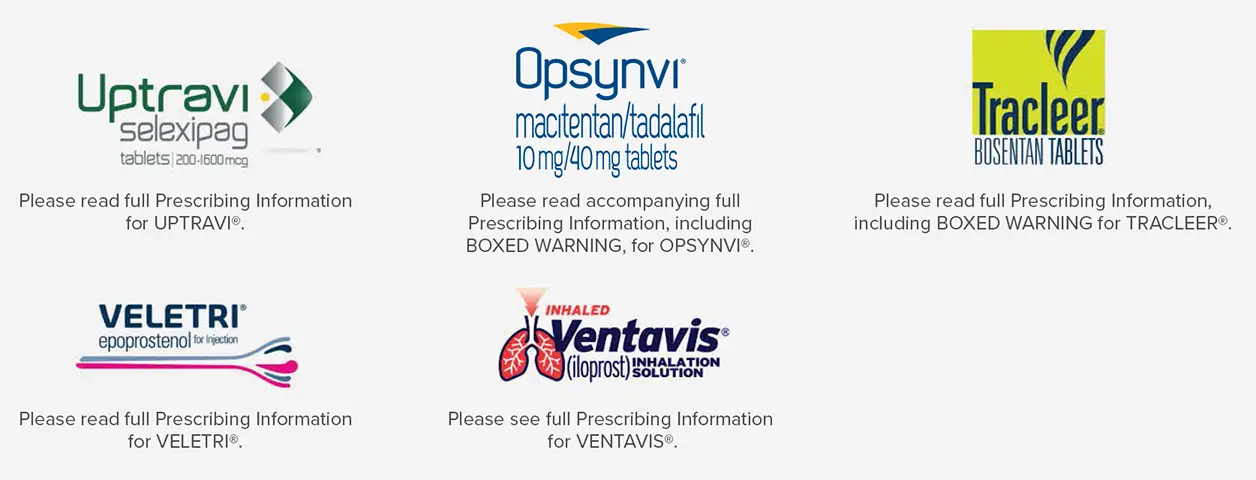OPSUMIT® (macitentan) has a well-studied safety and tolerability profile
Adverse reactions in the SERAPHIN study1
| Adverse reactions more frequent with OPSUMIT® 10 mg vs placebo by ≥3% | OPSUMIT® 10 mg (n=242) |
Placebo (n=249) |
|---|---|---|
| Anemia | 13% | 3% |
| Nasopharyngitis /pharyngitis |
20% | 13% |
| Bronchitis | 12% | 6% |
| Headache | 14% | 9% |
| Influenza | 6% | 2% |
| Urinary tract infection | 9% | 6% |
The overall incidence of treatment discontinuations due to adverse events with OPSUMIT® (approximately 11%) was similar to placebo (approximately 12%)1,2
Additional adverse events of special interest1-3
| OPSUMIT® 10 mg (n=242) |
Placebo (n=249) |
|
|---|---|---|
| Hypotension | 7.0% | 4.4% |
| Edema | 21.9% | 20.5% |
| Peripheral edema | 18.2% | 18.1% |
Incidence of elevated aminotransferases/decreases in hemoglobin1,2
| OPSUMIT® 10 mg (n=242) |
Placebo (n=249) |
|
|---|---|---|
| ALT/AST elevations >3 x ULN | 3.4% | 4.5% |
| ALT/AST elevations >8 x ULN | 2.1% | 0.4% |
| Patients with Hgb <10 g/dL | 8.7% | 3.4% |
Drug-drug interactions1
| MEDICATION | EFFECT |
|---|---|
| Strong inducers of CYP3A4 (eg, rifampin) |
|
| Strong inhibitors of CYP3A4 (eg, ketoconazole) |
|
| Moderate dual inhibitors of CYP3A4 and CYP2C9 (eg, fluconazole and amiodarone) |
|
| Combined moderate CYP3A4 inhibitor and moderate CYP2C9 inhibitor |
|
Postmarketing experience with OPSUMIT®1
Because these following adverse reactions are reported voluntarily during post-approval use of OPSUMIT® from a population of uncertain size, it is not always possible to reliably estimate their frequency or establish a causal relationship to drug exposure.
- Hypersensitivity reactions (angioedema, pruritus, and rash)
- Flushing
- Nasal congestion
- Elevations of liver aminotransferases (ALT, AST) and liver injury; in most cases alternative causes could be identified (heart failure, hepatic congestion, autoimmune hepatitis). Endothelin receptor antagonists have been associated with elevations of aminotransferases, hepatotoxicity, and cases of liver failure
- Edema/fluid retention. Cases of edema and fluid retention occurred within weeks of starting OPSUMIT®, some requiring intervention with a diuretic, fluid management, or hospitalization for decompensated heart failure
- Symptomatic hypotension
Patient Support Programs
LEARN MORE
ALT=alanine aminotransferase;
AST=aspartate aminotransferase;
CYP=cytochrome P450;
Hgb=hemoglobin;
HIV=human immunodeficiency virus;
PAH=pulmonary arterial hypertension;
SERAPHIN=Study with an Endothelin Receptor Antagonist in Pulmonary Arterial Hypertension to Improve CliNical Outcome;
ULN=upper limit of normal.
References:
1. OPSUMIT® (macitentan) full Prescribing Information. Actelion Pharmaceuticals US, Inc.
2. Pulido T, Adzerikho I, Channick RN, et al; SERAPHIN Investigators. Macitentan and morbidity and mortality in pulmonary arterial hypertension. N Engl J Med. 2013;369(9):809-818 and suppl 1-21. doi:10.1056/NEJMoa1213917
3. US Dept of Health and Human Services, US Food and Drug Administration, Center for Drug Evaluation and Research. Opsumit® (macitentan) NDA 204410. Accessed July 19, 2024. http://www.accessdata.fda.gov/drugsatfda_docs/nda/2013/204410Orig1s000MedR.pdf



